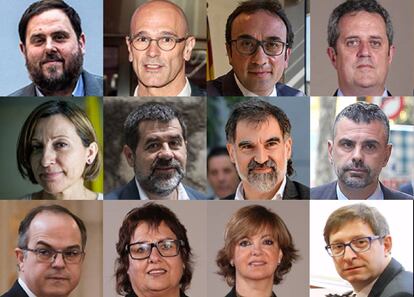Catalan prison authorities propose ordinary regime for separatist leaders
The recommendation, which is not binding, would mean that the nine men and women currently in jail would not immediately be able to apply for parole or enjoy day release

Penitentiary authorities in Catalonia are proposing an ordinary prison regime for the nine separatist leaders who were sentenced to prison in October over their roles in the 2017 breakaway bid from Spain.
The segundo grado is the most common regime in Spain’s penitentiary centers, and it means that inmates cannot immediately apply for parole. In its October decision, the Supreme Court had left the door open to the possibility of tercer grado, a more open regime that allows convicts day release, spending only the nights of Monday through Thursday in jail.
The proposal has been made by a technical body made up of prison directors, psychologists, educators, jurists and social workers
The proposal has been made by a technical body made up of prison directors, psychologists, educators, jurists and social workers. Their report is not binding, and the Catalan department of justice will have the final word. The Catalan regional government said that the decision had been adopted after “an intense debate” and “not unanimously.”
The measure affects former Catalan deputy premier Oriol Junqueras, the former regional department chiefs Joaquim Forn, Jordi Turull, Josep Rull, Dolors Bassa and Raül Romeva; former Catalan parliament speaker Carme Forcadell; and the heads of two civil society associations, Jordi Cuixart of Omnium Cultural and Jordi Sànchez of Assamblea Nacional Catalana (ANC).
On October 14, the Spanish Supreme Court sentenced these individuals to between nine and 13 years in prison after finding them guilty of sedition in connection with the unilateral breakaway attempt of October 2017.
The technical report will now go to the Catalan justice department, whose chief is Ester Capella, of the separatist party Catalan Republican Left (ERC). Oriol Junqueras, who received the highest prison sentence in October, is the president of ERC.
The report will now go to the justice department, which is run by Ester Capella of the separatist Catalan Republican Left party
Amand Calderó, secretary general of penitentiary affairs at the Catalan department of justice, said that the team that will classify the prisoners is “a strictly technical body outside the political debate.”
“Sentences are handed down by the judges. The Generalitat [Catalan government] does not dictate the sentences. Penitentiary services act to fulfill a judicial mandate,” he said.
Wednesday’s proposal has created a new rift between ERC and the region’s other main separatist party, Together for Catalonia (JxCat). While all the prisoners were hoping for the tercer grado, the lawyers for ERC were more willing to accept the possibility that this early report would suggest a stricter regime. But JxCat, whose leader is Carles Puigdemont, the former Catalan premier currently living in self-imposed exile in Belgium, believes prisoners should access the open regime straight away.
English version by Susana Urra.
Tu suscripción se está usando en otro dispositivo
¿Quieres añadir otro usuario a tu suscripción?
Si continúas leyendo en este dispositivo, no se podrá leer en el otro.
FlechaTu suscripción se está usando en otro dispositivo y solo puedes acceder a EL PAÍS desde un dispositivo a la vez.
Si quieres compartir tu cuenta, cambia tu suscripción a la modalidad Premium, así podrás añadir otro usuario. Cada uno accederá con su propia cuenta de email, lo que os permitirá personalizar vuestra experiencia en EL PAÍS.
¿Tienes una suscripción de empresa? Accede aquí para contratar más cuentas.
En el caso de no saber quién está usando tu cuenta, te recomendamos cambiar tu contraseña aquí.
Si decides continuar compartiendo tu cuenta, este mensaje se mostrará en tu dispositivo y en el de la otra persona que está usando tu cuenta de forma indefinida, afectando a tu experiencia de lectura. Puedes consultar aquí los términos y condiciones de la suscripción digital.








































